The milestone of modern medicine is diagnostic tests, which play a crucial role in diagnosing illnesses and guiding therapeutic approaches. Diagnostic tests are standard procedures that are performed to identify certain diseases or conditions in an individual. The diagnostic test results assist doctors in the management of diseases and in making treatment decisions.
Importance of diagnostic tests
Accurate Diagnosis
Accurate diagnosis of disease conditions is vital for effective health management. It helps doctors identify the underlying cause of a patient's symptoms. Accurate diagnosis is essential for differentiating diseases that are similar but require different treatments.
Early detection
Diagnostic tests such as a complete blood count (CBC), thyroid profile, lipid profile, etc. help identify diseases at an early stage. Early detection allows doctors to give better treatment options to patients.
Tracking disease progression
Diagnostic tests help track disease progression, such as in chronic conditions that require long-term management. With routine check-ups and follow-up tests, the doctor can monitor the treatment's effectiveness, make necessary changes to the treatment, and ensure the patient's health.
Common diagnostics tests
Complete Blood Count (CBC)
A CBC is a blood test used to measure the blood's RBC, WBC, hemoglobin, platelets, and hematocrit. CBC is performed as a routine health exam and also to identify the cause of sudden symptoms, including weight loss, fever, and fatigue. It is used to monitor severe conditions such as anemia, thrombocytosis, leukocytosis, thrombocytopenia, and nutritional deficiencies. Physicians can learn about the underlying medical condition and provide suitable treatment using the test interpretations.
Basic Metabolic Panel (BMP)
The BMP test measures eight different components in the blood, such as calcium, sodium, glucose, potassium, bicarbonate, blood urea, nitrogen, chloride, and creatinine, providing key information about the body's metabolism and chemical balance. This test evaluates blood sugar levels, kidney function, acid-base balance, and fluid-electrolyte balance. Usually, doctors perform it as part of routine health checkups and when individuals experience fatigue, breathing issues, vomiting, and confusion. It helps to diagnose, screen, and monitor the disease conditions.
Comprehensive Metabolic Panel (CMP)
The CMP test measures albumin, alkaline phosphatase (ALP), aspartate aminotransferase (AST), alanine aminotransferase (ALT), and total protein. It provides information regarding the body’s metabolism and the balance of chemicals in the body. The CMP test is commonly used to evaluate kidney and liver function.
Thyroid Panel
Thyroid tests are blood tests used to measure thyroid gland function in the body. The thyroid gland (a butterfly-shaped gland) releases the hormones triiodothyronine (T3) and thyroxine (T4). People who are not producing enough thyroid hormone can develop a condition known as hypothyroidism and they may experience depression, weight gain, and low energy. On the other hand, a condition known as hyperthyroidism can result in symptoms such as tremors, anxiety, and weight loss, caused by an excess of thyroid hormones in the body. Blood tests such as thyroid stimulating hormone (TSH), T3, T4, and thyroid antibodies and imaging tests such as ultrasound, CT scan, and nuclear medicine tests are recommended by physicians to assess the thyroid gland function.
Cardiac Enzymes/biomarkers
Cardiac biomarkers are substances released into the bloodstream when the heart is damaged or stressed due to low oxygen levels. Enzymes are proteins that help to metabolize body functions such as blood clotting, breathing, digestion, and musculoskeletal movements. Cardiac biomarkers help to diagnose heart conditions such as coronary syndrome, myocardial infection, heart failure, and cardiac ischemia. These biomarkers include tests such as troponin, creatinine kinase, myoglobin, and brain natriuretic peptide (BNP). These tests are usually performed when an individual has chest pain, shortness of breath, or is profusely sweating.
Sexually transmitted infections (STIs)
STIs lead to sexually transmitted diseases (STDs), which are mainly spread by sexual contact. These infections can be due to viruses, bacteria, and parasites. HIV, syphilis, chlamydia, herpes, and hepatitis are a few STDs. Usually, these can be diagnosed through blood, urine, and swab samples.
Coagulation Panel
Coagulation tests measure the blood's ability to clot and how long it takes to clot when a person has an injury. Clotting tests include the prothrombin time (PT) and fibrinogen tests. These tests are important for diagnosing and managing bleeding disorders such as hemophilia, thrombosis, and liver conditions.
Fever Panel
The fever panel is a series of blood tests that help diagnose the cause of continual fever and other related symptoms. This test includes a complete blood count (CBC), a complete urine examination (CUE), interleukin-6, qualitative real-time PCR, and a tropical fever panel. The samples for these tests could include blood, urine, or a nasal swab to determine and diagnose the underlying cause of the fever. Your physician may recommend these tests if the signs and symptoms are seen for a longer duration, along with respiratory infections that can increase the risk of complications.
Home diagnostic tests
Home testing kits provide a convenient option for individuals to give samples from the comfort of their own homes. A healthcare professional will come to your residence at a scheduled time to collect the sample. Some people may have difficulty travelling to diagnostic centers due to illness, injury, or disability. Moreover, various home testing kits are available online and in supermarkets, enabling users to monitor conditions such as blood sugar levels and hypertension and also detect pregnancy.
Common home diagnosing tests are
- Complete blood count (CBC)
- Complete urine examination
- Blood group ABO& Rh
- Thyroid-stimulating hormone (TSH)
- Kidney renal function
- Hemogram
- Cholesterol level
- Coagulation factor
- Blood glucose fasting
- Liver function test
- Lipid profile
- Fever test
Diagnostic tests typically involve collecting blood, urine, and swab samples. Certain tests, like blood sugar, cholesterol, liver function, and kidney function tests, may require fasting for 8-12 hours. These tests play a crucial role in enhancing a patient's quality of life by enabling early disease detection and treatment planning by choosing the best diagnostics centre near you.


